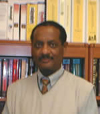Selassie attracted to MUSC's research focus
by Heather WoolwinePublic Relations
Those who meet Anbesaw Selassie, Dr.PH, for the first time notice his intelligence immediately, and that he’s, well, disarmingly nice.
 Dr.
Anbesaw Selassie
Dr.
Anbesaw Selassie
Selassie was born in Ethiopia and came to the U.S. in 1986 as a master’s degree student in the USC School of Public Health. As is widely known, Ethiopia struggles with many health problems that affect almost the entire population.
This background would fuel Selassie towards a career in preventive health care and epidemiology research at MUSC after his arrival on campus in 2000.
“I was originally introduced to the Charleston area while working for the only vector disease center (blood diseases associated with mosquitoes) in the country at that time,” Selassie said. “It was located in the McClellanville/Georgetown area. Since then I’ve always loved Charleston, and rarely find a place as beautiful.”
After completing his master’s degree in epidemiology in 1988, Selassie then pursued a doctorate in the same field and biostatistics, completing that degree in 1991. He was a research assistant professor and assistant professor at USC until his move to MUSC as assistant professor in the Department of Biometry and Epidemiology.
“MUSC was very attractive to me for many reasons,” Selassie said. “I loved how research-oriented it was and how a lot of that research echoed my own passion for preventative medicine and public health. There are many here who share the philosophy that the best medicine is prevention, and nothing exceeds that.”
Selassie, like many professionals working in the health care arena, believes one way to dent rising health care costs is through activities that prevent many problems, especially injuries.
His research here at MUSC represents that mindset, with three major studies addressing epilepsy and brain trauma totaling more than $1.3 million per year and concluding within the next several years.
“The study concerning brain trauma involves the Centers for Disease Control and is actually looking beyond the immediate concern of survival for brain trauma patients,” Selassie said. “Past research and physicians focused on survival and prolonging life. This study looks more at quality of life before and after brain trauma and how that affects patients in terms of financial situations, self-esteem, and emotional and mental issues. We know that many of these patients aren’t receiving care for these types of issues after survival, and this data will set the stage for more research into better treatment and possible prevention of these types of traumas.”
In terms of his epilepsy research, Selassie and his colleagues are trying to determine the exact number of people with actual epilepsy, as it is often misdiagnosed or vaguely defined as it pertains to patients suffering from seizures. These studies hope to determine South Carolina’s prevalence of the disease and illuminate better treatments and diagnoses related to epilepsy, including the venues of care and types of medical services they need.
And Selassie is adamant that MUSC’s position at the forefront of brain trauma research will continue to play a major role in the success of his own work. “We have increased visibility in the last several years thanks to our great experts in neurology, neurosurgery, and brain imaging research,” he said. “After recently chairing a congressional committee task force on brain traumas and injury, I’m seeing that this research is really moving into the limelight and becoming accepted as part of the national agenda. I’m glad that MUSC and I are a part of that.”
Selassie currently resides in Mount Pleasant with his wife, Lily, and
his three daughters, Helina, 21, Meron, 19, and Gelila, 12.
Friday, April 23, 2004
Catalyst Online is published weekly, updated
as needed and improved from time to time by the MUSC Office of Public Relations
for the faculty, employees and students of the Medical University of South
Carolina. Catalyst Online editor, Kim Draughn, can be reached at 792-4107
or by email, catalyst@musc.edu. Editorial copy can be submitted to Catalyst
Online and to The Catalyst in print by fax, 792-6723, or by email to petersnd@musc.edu
or catalyst@musc.edu. To place an ad in The Catalyst hardcopy, call Community
Press at 849-1778.